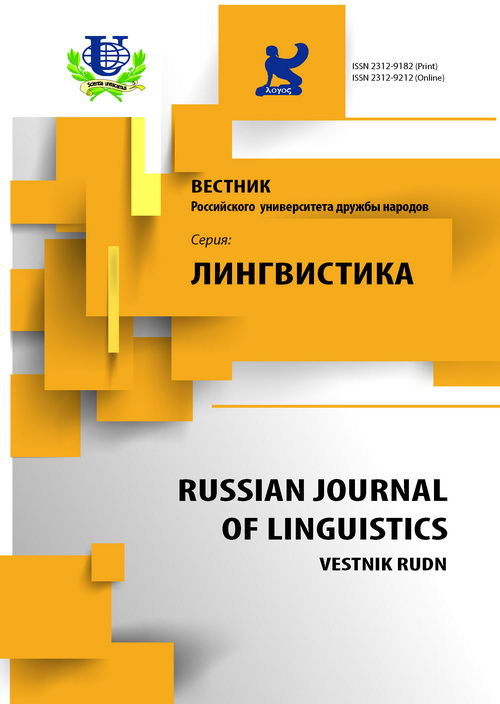Interdiscourse communication: the linguistic relativity perspective
- Authors: Gunta Rozina -1, Indra Karapetjana -1
-
Affiliations:
- University of Latvia
- Issue: No 4 (2013)
- Pages: 59-71
- Section: Articles
- URL: https://journals.rudn.ru/linguistics/article/view/9586
- ID: 9586
Cite item
Full Text
Abstract
The paper concerns the phenomenon of interdiscourse communication and views it from the perspective of Linguistic Relativity Theory. The goal of the paper is to analyse the linguistic behaviour of non-native language users, who apply the English language for instrumental purposes in interaction, which establishes in multinational discourse among interactants having different cultural backgrounds. The paper reports on some of the research results that were acquired in the period from 2011 to 2013 during the ERASMUS Intensive Programme project Cross-Cultural Competence and Interaction . The focus of the study was on analysing the linguistic and pragmatic strategies prioritised by the tertiary level Latvian and Lithuanian interactants for whom the English language served as the instrument of communication in the multinational discourse community, which was constructed of students from Latvia, Lithuania and Turkey. The research findings reveal that non-native language users having the cultural background of the Baltic States construct their own mode of interaction related to the linguistic behaviour, in which the interactants apply clarity and directness as the prevailing strategies of interdiscourse communication.
About the authors
- Gunta Rozina
University of Latvia
Email: rozina.gunta@inbox.lv
Department of English Studies
- Indra Karapetjana
University of Latvia
Email: indra.karapetjana@lu.lv
Department of English Studies
References
- Brown, P. and S. Levinson (1987). Politeness: Some Universals in Language Usage. Cambridge: Cambridge University Press.
- Cohen, A.D. (1996). Developing the Ability to Perform Speech Acts. Studies in Second Language Acquisition, 18, 253—260.
- Hall, E. (1976). Beyond Cultures. New York: Anchor Books. Holmes, J, Brown, D. (1987). Teachers and Students about Compliments. TESOL, Quarterly, 21, 523—546.
- House, J. (2000). Understanding Misunderstanding of a Pragmatic Discourse Approach to Analysing Mismanaged Rapport in Talk Across Cultures. In: H. Spencer-Oatey (ed.) Culturally Speaking: Managing Rapport Through Talk Across Cultures. London: Continuum, 145—164.
- Ishihara, N., Cohen, A.D. (2010). Teaching and Learning Pragmatics.London: Pearson. Johnston, J. (1985). How Personalities Attribute Structure in Interpersonal Relations. In: J. Berger and M.J. Zelditch (eds.) Status, Reward and Influence. San Francisco: Jossey Bass, 317—349.
- Karapetjana, I., Rozina, G. (2012). Baltic Journal of English Language, Literature and Culture, Riga: University of Latvia, Vol. 2, 63-72.
- Levelt, W.J. (1989). Speaking: From Intention to Articulation. Cambridge MA: MIT Press. Miles, P. (1994). Compliments and Gender. University of Hawai’ Occasional Papers Series, 26, 85—137.
- Sapir, E. (1949) Language. New York: Harcourt, Brace &World.
- Silberstein, S. (2002). Sociolinguistics. In Carter, R. and D.Nunan (eds.) The Cambridge Guide to Teaching English to Speakers of Other Languages. Cambridge: Cambridge University Press, 100-106.
- Spencer-Oatey, H. (2000). Rapport Management: A Framework for Analysis. In: H.Spencer-Oatey (ed.) Culturally Speaking. Managing Rapport Through Talk Across Cultures. London: Continuum, 11—46.
- Thomas, J. (1995). Meaning in Interaction: An Introduction to Pragmatics. London: Longman.
- Thomas, J. (1983). Cross-Cultural Pragmatic Failure. Applied Linguistics, 4, 91—112.
- Whorf, B. L. (1956). Language, Thought and Reality. In J.B. Caroll (ed.) Selected Writings of B.L. Whorf. MIT: Cambridge.
- Yule, G. (1996). Pragmatics. Oxford: Oxford University Press.
- Žegarac, V., M. Pennington. (2000). Pragmatic Transfer in Intercultural Communication.
Supplementary files















